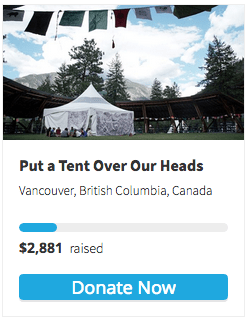Camp Confluence
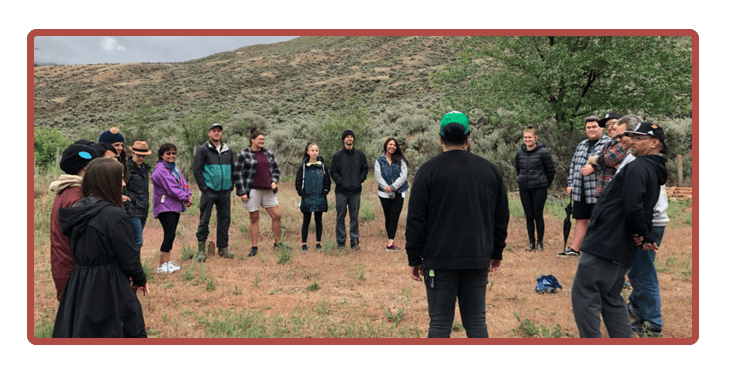
June 13, 2019 — Cawston, BC: Each spring before the summer camp season starts, we host a training intensive for our network of facilitators. The Camp Confluence is a rare and joyful opportunity to bring our diverse team together to strengthen skills and relationships.
Our most recent Confluence was held May 24-26 at IndigenEYEZ headquarters (aka our Program Director Kelly’s home) on the Lower Similkameen Indian reserve in Cawston, BC.
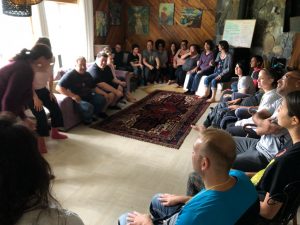
Confluence allows our facilitators to share the experiences and knowledge they’ve gained over the year, and receive feedback from colleagues and peers. Team building was a core goal this year because when we have stronger relationships, we facilitate more effectively with one another.
We are delighted to share a few tidbits from this rich feast with you here.
Strength-based Communication
Strength-based communication was a focus topic this year—offering tools for shifting from lateral violence to lateral kindness.
In one exercise, participants were asked to think of a person who drives them bananas. They were asked: “In two words or less, who is this person?” Answers were generally about the behaviors of the person: bossy, stubborn, arrogant…. You get the idea.
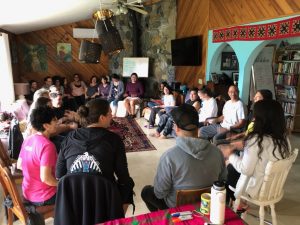 Then they were asked: “In two words or less, who else is this person?” These answers focused on the person’s needs or something they lack: insecure, unhappy, lonely…
Then they were asked: “In two words or less, who else is this person?” These answers focused on the person’s needs or something they lack: insecure, unhappy, lonely…
Finally, participants were asked: “In two words or less, who else are they, not so much their roles but their qualities?” These answers were mostly about the person’s strengths: outgoing, determined, insightful…
The learn is that every single person has a set of strengths, no matter how annoying their behavior maybe. A person’s behavior is their best strategy for getting their needs met. We get to choose what we make people’s behaviors mean. If we shift the lens through which we view them—focusing on their strengths rather than what bugs us about them, we can shift from lateral violence to lateral kindness and liberation. It helps us to have compassion since everyone is doing the best they can at any moment given their life experience and self-awareness. If they knew better, they would do better.
One Confluence participant said that this exercise really shifted her viewpoint about the behavior of a co-worker she finds challenging. She could see that underneath their behavior was an effort to feel belonging—something she could relate to and see in herself.
Broken Agreements
This year we had the benefit of being joined by Nadia Chaney, the Director of Training for our mentor organization, Partners For Youth Empowerment (PYE). Nadia specializes in conflict transformation, anti-oppression work, and creative 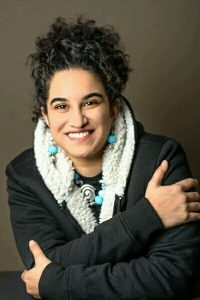 risk-taking. She has taken her sparkling mind and energy to communities around the world including Uganda, India, Egypt, Spain, and Jamaica to name a few.
risk-taking. She has taken her sparkling mind and energy to communities around the world including Uganda, India, Egypt, Spain, and Jamaica to name a few.
Nadia brought forward the topic of safety at youth camp and how to deal with broken agreements in a way that lifts and affirms youth, rather than shaming them.
At the beginning of a Youth Camp agreements are made between all of the attendants and the facilitators. This includes agreements such as to not leave the campgrounds, turning in electronic devices (such as ipods or smartphones) over to the camp manager, as well as only speaking uplifting words to each other; no put downs or negative attitudes.
She posed the question: How do we help youth grow when they make mistakes, or when youth conflict arises? Nadia used a simple set of 4 questions that she tentatively called, “The Responsibility Process” to ensure safety without punishment:
1) What happened?
2) What was the impact on the group?
3) What would you do next time?
4) What can we do differently right now?
It’s such a simple method, but effective, especially when tensions or emotions are high among youth. It was such a pleasure to have Nadia with us and to learn from her expertise.
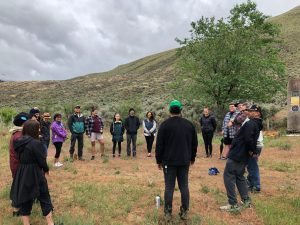
Connecting with the Land
Because Camp Confluence was held in the Okanagan territory, which is also where our upcoming youth camp starts on July 14th, Syilx facilitator Skayu Louis shared Okanagan teachings and stories.
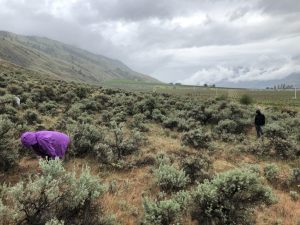 One exercise was called “Smell a Smell.” In partners, each participant went out on the land in different directions to find a smell. It could be a plant, dirt, a few flowers, anything, but not animal droppings LOL. Then participants wrapped the item in a small cloth, met up with their partners to exchange items, smell the cloth, and try to identify what was inside.
One exercise was called “Smell a Smell.” In partners, each participant went out on the land in different directions to find a smell. It could be a plant, dirt, a few flowers, anything, but not animal droppings LOL. Then participants wrapped the item in a small cloth, met up with their partners to exchange items, smell the cloth, and try to identify what was inside.
This was a great exercise because it took time to find a distinct smell and then identify it. Several participants commented on how it helped them to be more present on the land, more connected to various plants and elements that they normally wouldn’t connect with. Others mentioned how it helped them to tune into their senses such as sight, touch, and smell.
Critical Moment Dialogue
We were happy to have IndigenEYEZ co-founder Kim Haxton at Confluence to share her wisdom and lead many impactful sessions. One session was called “Critical Moment Dialogue.”
Critical Moment Dialogue or CMD, gives facilitators, educators, and leaders who are in the midst of complex or ambiguous situations the opportunity to stop, focus, reflect, and adjust. CMD focuses on trigger moments and supports us to notice our mental, emotional, and physical responses to these moments.
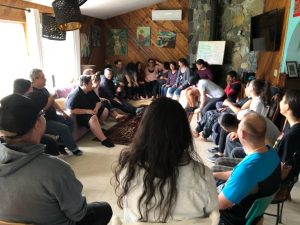
Kim asked everyone to share a trigger moment with the person next to them: a moment when we felt judged or put out. As Kim shared, “A lot of times, we are all expressing ourselves from a place of wounding; so a lot of punishment, shame, and fear separates us. Sometimes the communication channels are not clear, and the result is a trigger moment. We will all go down with the ship if we don’t help each other, but it starts with us first.”
There are 4 quick reflection questions to CMD:
1) Mentally: What judgments or assumptions am I having about what just happened? What stories am I telling myself about this person? Or about me?
2) Emotionally: How am I feeling?
3) Physically: Where am I feeling it in my body?
4) Spiritually: What is the best thing to do for my highest good?
Sometimes it just takes follow-up clarification because we make incorrect assumptions. Or miscommunication might come from unresolved issues in our past. We carry these longstanding wounds in our bodies and they can cause dis-ease. With awareness, these wounds can be addressed.
Sometimes it’s better to just walk away because if you say something to that person they might not even hear you. When you believe you are unworthy, you disassociate to protect yourself. Sometimes this keeps us safe, but sometimes it shows up when nothing threatening is happening, and it doesn’t serve us.
One participant said: “The CMD workshop helped me to slow down and be with the experience instead of just getting lost or caught up in it. By the fourth question, I had a plan on what I could do to take care of myself in this situation, and I was able to move forward and make a step towards dealing with it.”
Those are just a few stories from a full weekend of growth, rejuvenation and inspiration.

We need your help! Our crowdfunding campaign only needs $150 to cross the $3,000 mark!
Our goal is to buy our own Gathering Place tent for our land-based work. Since we began hosting camps we’ve paid enough in rental fees to buy our own tent several times over. Help us reduce our camp costs and respond to the demand for more wilderness trainings.
Every dollar counts! Donate today! https://chuffed.org/project/help-us-buy-the-gathering-place-tent
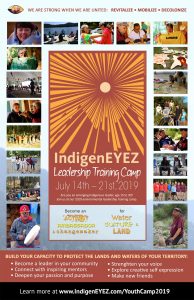 Our summer camp is next month!
Our summer camp is next month!
From July 14th-21st we will be hosting our on-the-land camp near Hedley, BC. This camp is for Indigenous youth and mentors who want to strengthen their leadership skills so that they can take action for positive change in their own communities around issues like climate change, water stewardship, and land advocacy.
We are still accepting camp applications!
To learn more or to apply visit:
https://indigeneyez.com/youthcamp2019/

